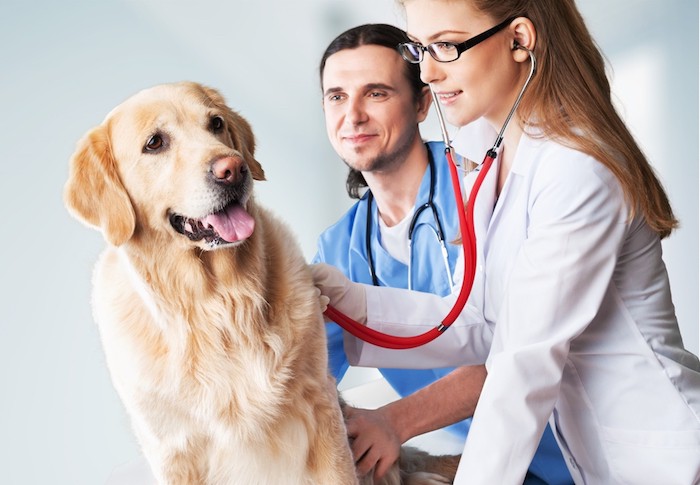What Happens to the Dog in Ben Is Back

Stuffy noses are no fun.
Nasal congestion can make it difficult to breathe and ruin the way your food tastes. If untreated, it may even lead to sinus infections and other problems.
Dogs can suffer from nasal congestion too. And, just like in humans, it probably makes them feel miserable.
In fact, because your dog learns more about the world through his nose than you do, it is likely that stuffy noses are even more irritating for dogs than they are for people.
Below, we'll talk about what you need to do when your dog has nasal congestion and discuss the use of decongestants and other medications for dogs.
- Just like us, dogs can suffer from the occasional bout of congestion. Many mild cases resolve on their own, but lingering congestion and cases that involve additional symptoms will require veterinary attention.
- There are a variety of things that can cause nasal congestion in dogs. This includes things like a virus or bacterial infection, as well as objects lodged in the nose.
- There are a few medications that can help canine congestion, but you'll need to discuss them with your vet first. Never give your dog any medication — even an OTC option — without first discussing it with your vet.
- There are also some home remedies that may help ease minor congestion. This includes things like using a nasal aspirator or letting your doggo hang out while you steam up the bathroom by turning on a hot shower.
Why Do Dogs Get Stuffy Noses?
Dogs suffer from stuffy noses for a variety of reasons, including several which can cause similar symptoms in humans.
Some of the most common causes of nasal congestion in dogs include:
- Head colds (viruses)
- Allergies
- Bacterial infections
- Fungal infections
- Foreign bodies in the nose
Less frequently, dogs may suffer from congestion as a side effect of heart disease. There are also a few ailments that seem to afflict some breeds more than others.
For example, lymphocytic-plasmacytic rhinitis – a condition which causes nasal discharge and irritation – most commonly afflicts dachshunds.
How Can You Tell If Your Dog's Nose Is Congested?
Some ailments are easy to recognize in dogs, but others are less obvious.
Intestinal issues, for example, are pretty apparent, but it can be hard to tell if your dog has a headache.
Nasal congestion lies somewhere in between the extremes, as there are a few signs that can indicate your dog is suffering from a stuffy snout, but you won't see your pup walking around trying to blow his nose.
Some of the symptoms that suggest your dog is suffering from a stuffy nose include:
- Sneezing
- Swelling around the nose or muzzle
- Discharge
- Unusual breathing sounds
- Reduced appetite
- Lethargy
- Depression

Do You Need to Take Your Dog to the Vet for a Stuffy Nose?
In many cases, a simple stuffy nose is not troubling enough to warrant a trip to the vet. This is especially true if the congestion resolves on its own within a 24 hours or so and your dog appears healthy in most other ways.
However, if the congestion lasts for more than about 48 hours, only seems to affect one nostril, or if it is accompanied by a fever or green discharge, you should take your dog in for an examination.
Additionally, if you note any neurological problems – holding the head in unusual positions, loss of balance, uncoordinated movements – you'll want to take your dog in promptly.
Need Veterinary Help Fast?
Don't have easy access to a vet? You may want to consider getting help from JustAnswer — a service that provides instant virtual-chat access to a certified vet online.
You can discuss the issue with them, and even share video or photos if need be. The online vet can help you determine what your next steps should be.
While talking with your own vet — who understands the ins and outs of your dog's history — is probably ideal, JustAnswer is a good backup option.
Can You Give a Dog a Decongestant?
Congestion often occurs because the blood vessels in the nose swell, reducing the amount of air that can flow through the nose and, consequently, making it difficult to breathe. So, people suffering from stuffy noses often take decongestants to feel better.
Decongestants help reduce the size of the blood vessels, which allows more air to flow through the nasal passages and allows the mucus to drain away.
Dogs can benefit from decongestants in the same manner. However, you should never give your dog a decongestant without first consulting your vet. Some decongestants are actually combination medications which contain other, potentially harmful, drugs.
Additionally, decongestants are not suitable for dogs suffering from some health conditions.
You'll also need to know the proper dosage to provide your dog. Only your vet can determine the correct dosage for your pooch, which further highlights the importance of veterinary assistance when dealing with a congested pet.

For that matter, you'll also need an accurate weight, which your vet is better prepared to determine than you are.
If your dog is healthy and not on any medications, you may be able to consult a vet online through the Just Answer service, which can put you in touch with a vet over a live chat. You can even share videos or images and get an instant diagnosis from them.
How Do You Unclog a Dog's Nose? Home Remedies for Your Dog's Stuffy Nose
If your dog is only experiencing a temporary and mild case of nasal congestion, you may be able to treat the problem at home. Just be sure that you contact your vet if his symptoms worsen or the congestion doesn't go away in a day or two.
A few of the best home remedies and care strategies for congested canines include:
Gently massage your pup's nose to loosen the mucus and allow it to drain. This likely feels good to your dog in the same way it often feels good to massage the bridge of your own nose when you're congested.
Use a nasal aspirator (like this one) to suck out the excess mucus. Be very gentle while doing so, and be sure that you only insert the tip of the aspirator into your pet's nasal passages. Be sure to clean the aspirator thoroughly after use, and, although I really hope this needn't be said, don't use the same aspirator on your dog that you use for your child.
Have your dog lay on the bathroom floor while you take a hot shower. The steam will help moisturize his nasal passages and potentially allow the mucus to drain away. Be sure to leave the exhaust fan off so you don't end up just pumping the humid air outside.
Use a humidifier to raise the amount of moisture in the air inside your home. If you confine your dog to a small room with the humidifier, it'll likely produce better results. Be especially careful to clean your humidifier regularly in the manner outlined by the manufacturer – dirty air humidifiers can cause additional health problems.
Are There Any Over-the-Counter Medications You Can Give Your Dog for a Stuffy Nose?
A few common human medications may be helpful for treating your dog's nasal congestion. For example, some vets recommend oxymetazoline (Afrin) for dogs suffering from congestion.
However, other common medications humans use can be toxic to pets.

Accordingly, you should never give your dog an over-the-counter medication for nasal congestion without first consulting your vet. Then, if your vet gives you the green light, administer the medication in exactly the dosage and manner prescribed by your vet.
Acute Vs. Chronic Nasal Congestion
A short-term bout of nasal congestion is typically not a big deal. Most pups should recover on their own in a day or two. But some dogs end up suffering from long-term, chronic congestion, which can seriously reduce their quality of life.
In such cases, it is not only important to work with your vet to treat the symptoms related to congestion but to also take steps to identify the cause of the problem. This isn't always possible, but it is something that you should always try to do.
Start by journaling your dog's symptoms. Write down the time and date that the congestion started, and also record when he starts being able to breathe easily again. Note any treatments you or your vet employed and document their apparent efficacy.
It may turn out that your pet is allergic to something in your home (such as smoke, dust, or even your cat), or that your pet has an environmental allergy to grass, tree pollen or polluted air. In other cases, it may turn out that your dog simply has a predisposition to nasal congestion.
Nasal congestion usually isn't a big deal for dogs, particularly if it only lasts a short time. But your dog will probably feel pretty rotten while he's stuffed up, so be sure to try some of the remedies described above.
Consult your vet if the stuffy nose is accompanied by other symptoms or lasts longer than a few days.
Has your dog ever suffered from nasal congestion? How did you treat it? Did you need your vet's help or did the congestion resolve on its own? Let us know your experiences in the comments below!
What Happens to the Dog in Ben Is Back
Source: https://www.k9ofmine.com/dog-nasal-congestion/
0 Response to "What Happens to the Dog in Ben Is Back"
Post a Comment